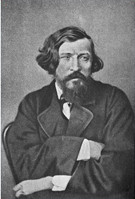
Unknown Chernyshevsky in the Presidential Library collection
In honor of the 185th anniversary of Nikolai Chernyshevsky, who was born July 24, 1828, the Presidential Library presents rare books that reveal new, "unconventional" sides of the personality of the known publicist and public figure of the 19th century.
Chernyshevsky’s name is closely linked with the history of socio-political magazine “Sovremennik” ("Contemporary"), where he began working from the fall of 1853. Chernyshevsky was charged to maintain two major departments of the "Contemporary": political and critical. Under him the magazine became a platform to express the views of revolutionary democracy. The Presidential Library digitized the fifth volume of the complete collection of works by Chernyshevsky, which contains the articles of the "Policy" department of the "Contemporary" dating back to 1859.
Yuri Steklov’s "Chernyshevsky: His Life and Work", reprinted in 1928, on the centenary of the writer, reveals the young Chernyshevsky from an unexpected side. Parents (his father was a priest) "developed in the boy a strong religious sentiment, which lodged in him so deeply that even as a student and prone to extreme revolutionary doctrines Chernyshevsky could not immediately get rid of the Christian faith, and even until maturity remained penchant for exterior ritualism (went to church services and crossed himself in from of the temples)." To the end of his life Chernyshevsky had problems with comporting himself in society - the author adds, - he was shy of strangers, embarrassed at crowded meetings and unwittingly made slips.
In July 1862, the temporary ban on the release of the "Contemporary" was followed by the arrest of Chernyshevsky. According to "The process of Chernyshevsky," he planned to do serious scientific research, was preparing to relieve himself from charges related to the magazine. He took the arrest calmly. Chernyshevsky was taken to Alexis Ravelin of the Peter and Paul Fortress. His papers and several books were sent to the 3rd Division. By the way, many of the documents seized during the search make part of this book.
Another publication, a volume from the series "Historical and Revolutionary Library" published by the Society of Former Political Prisoners and Exiles, contains some interesting information on the presence of Chernyshevsky in custody. The book also presents an excerpt of the novel "What to do?" unprinted in the final text, which Chernyshevsky was writing during his imprisonment in the Peter and Paul Fortress.
It also tells about place of his imprisonment from January 1872 - Vilyuisk, near Yakutsk. He was in solitary confinement. Any literary activity was prohibited to him. "I knew - writes in his memoirs the assistant police officer - that during winter nights Nikolai Gavrilivich was writing something, and in the morning he burned it all. One day I asked him why he did it. He replied: "... If all this time I was not writing anything, I might go mad, or forget everything; but what I once wrote, I would never forget.” The former employee of the prison said that after the release of Chernyshevsky "I received a package by mail: shoes and coat, which Nikolai Gavrilovich put on when he was leaving." And in the parcel was a "pile of mailing paper", the lack of which the author notes repeatedly complained about to Chernyshevsky...
Many politicians and public figures are estimated quite clearly, while they were all human beings, with their own personal characteristics and mannerisms, often contradicting conventional notions about them. The Presidential Library will continue to publish the little-known documents, books and memories of the personalities who played an important role in the history of Russia.

